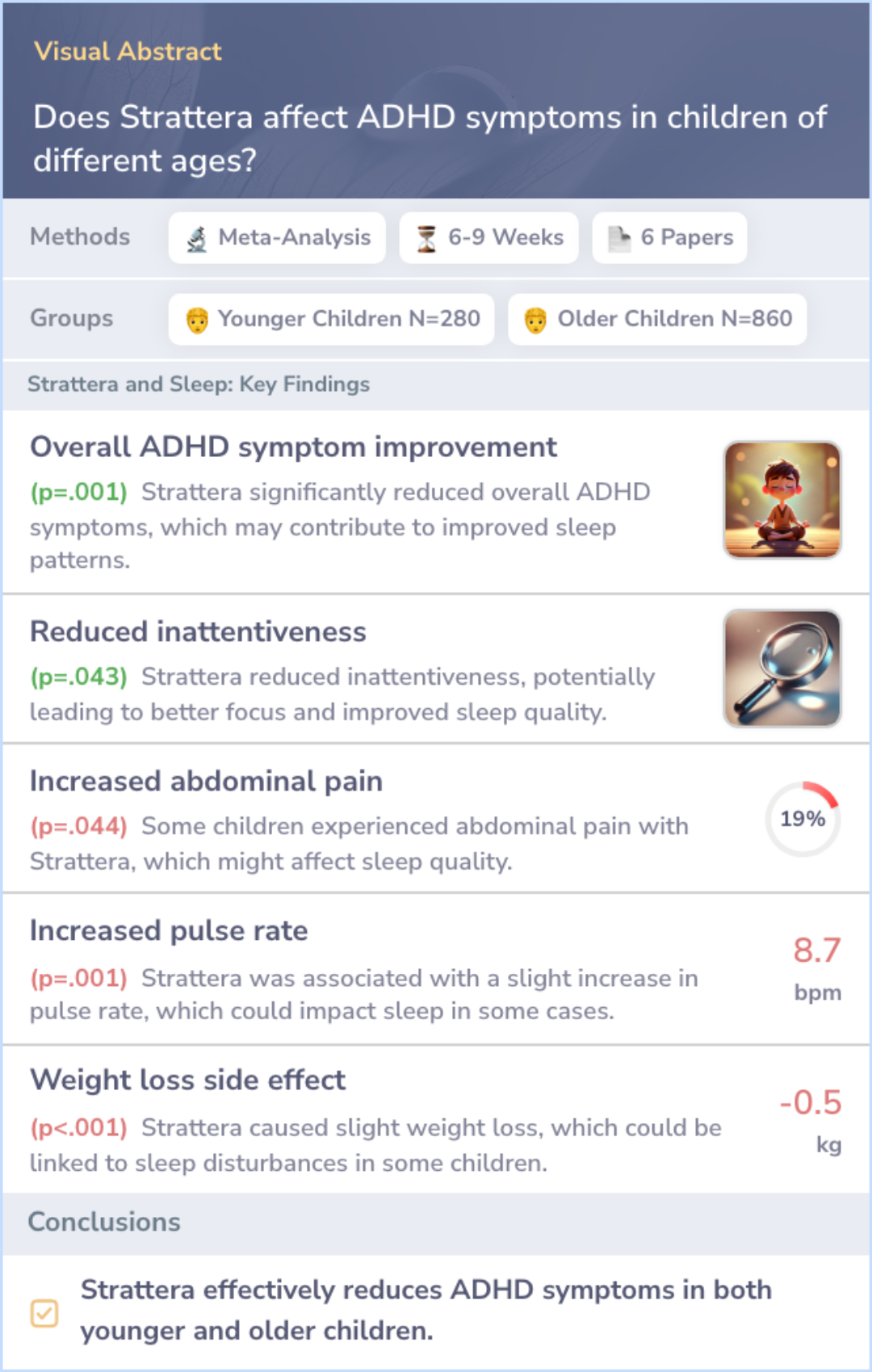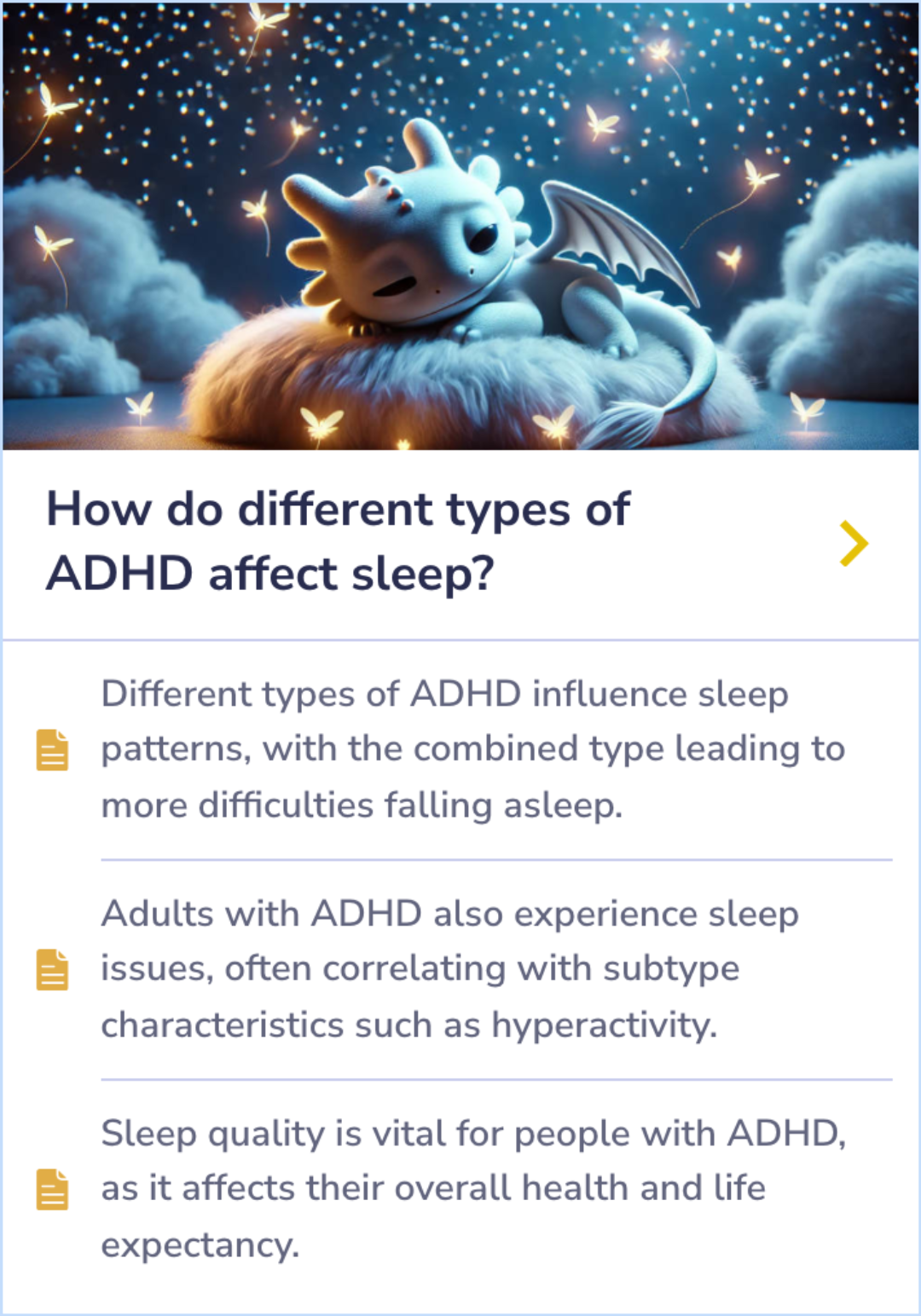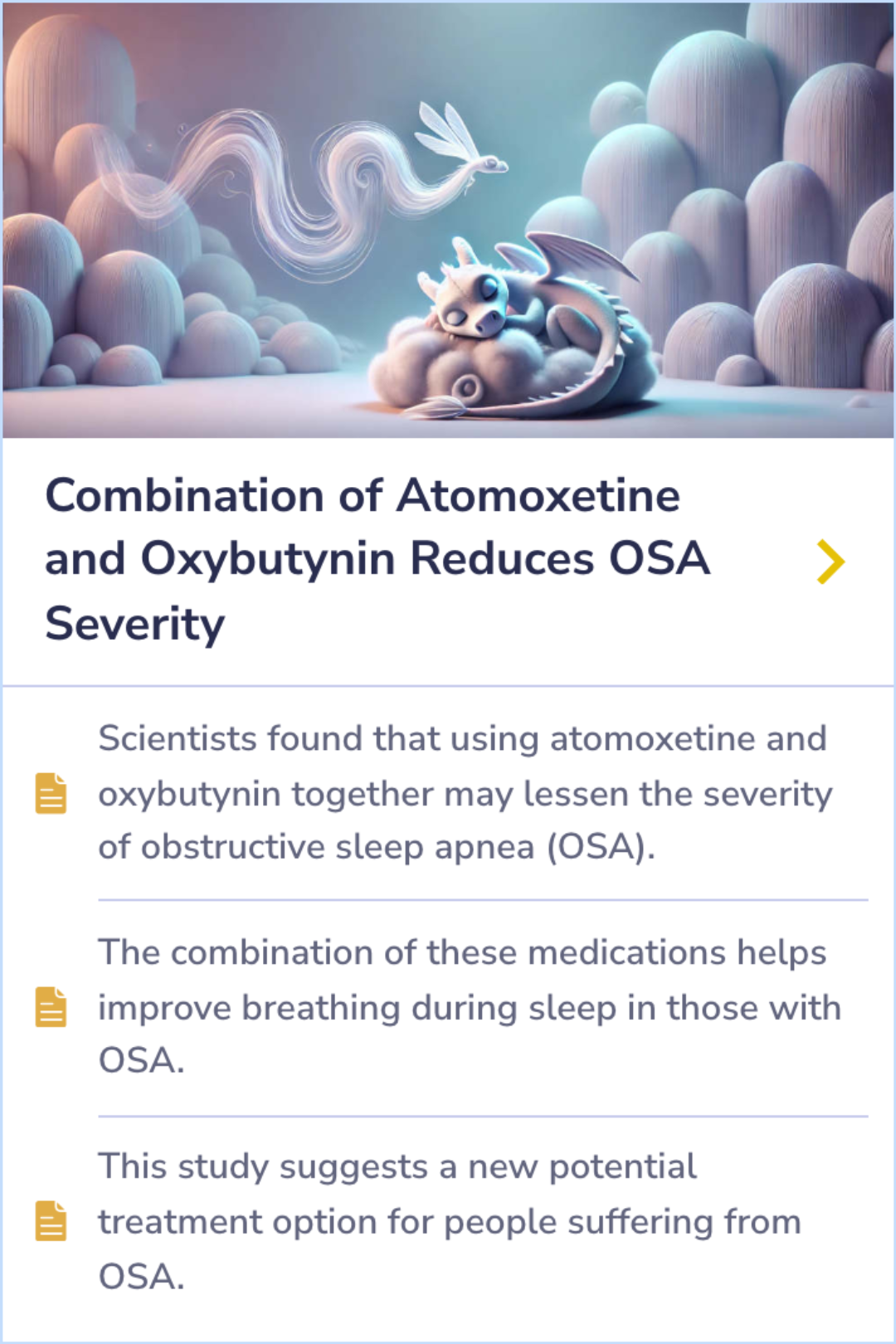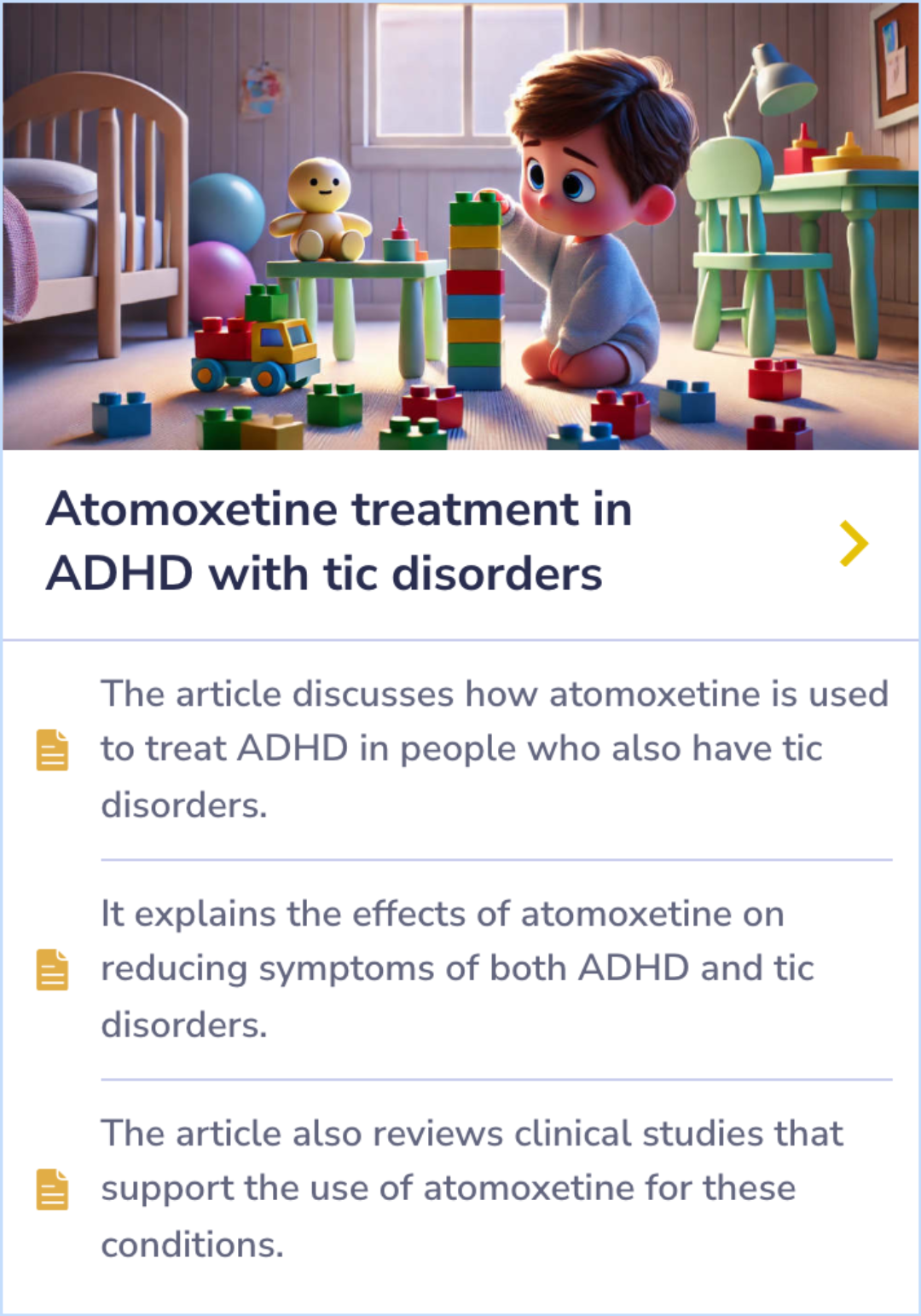Strattera
Studies Summary
🛌
Common Sleep Issues with Strattera
Strattera often leads to sleep disturbances like insomnia and sleep disorders. This can impact the ability to fall or stay asleep.
😴
Daytime Sleepiness and Fatigue
Patients on Strattera may also experience excessive daytime sleepiness, which affects daily functioning and leads to persistent fatigue.
🌜
Nighttime Restlessness and Jitteriness
Strattera can cause nighttime restlessness and jitteriness, making it difficult to relax and fall asleep, which exacerbates sleep disturbances.
Highly Cited Studies
Long term Effects of Methylphenidate in Adults
Peer Reviewed Study 1
Strattera leads to shorter sleep-onset and easier waking in children with ADHD
Peer Reviewed Study 2
Strattera's Effectiveness in Treating ADHD in Children
Background: Sleep Disturbances with Strattera
Strattera (atomoxetine) is associated with sleep disturbances, including insomnia and other sleep disorders. Insomnia affects a significant number of users and can make it difficult to fall or stay asleep.
These issues are common and may need adjustments in treatment for better management.
These issues are common and may need adjustments in treatment for better management.
In adult ADHD controlled trials, the rates of insomnia (15% of PMs, 10% of EMs) were increased among atomoxetine subjects compared with placebo subjects (7% of PMs, 4% of EMs).
Background: Daytime Sleepiness and Fatigue on Strattera
Some patients on Strattera experience excessive daytime sleepiness, known as somnolence. This can lead to persistent fatigue and may significantly affect daily activities.
Balancing the dosage and timing of Strattera is important in minimizing these side effects.
Balancing the dosage and timing of Strattera is important in minimizing these side effects.
“
Source Quotes:
Commonly observed adverse reactions in acute child and adolescent, placebo-controlled trials include somnolence (11% in Strattera-treated patients, 4% in placebo-treated patients).
Fatigue (6% to 10%)
Background: Nighttime Restlessness and Jitteriness with Strattera
Strattera can cause nighttime restlessness and jitteriness, making it difficult for some patients to relax and fall asleep.
These symptoms may worsen sleep disturbances and require specific attention from healthcare providers.
These symptoms may worsen sleep disturbances and require specific attention from healthcare providers.
The following reactions did not meet this criterion but were reported by more atomoxetine-treated patients than placebo-treated patients and are possibly related to atomoxetine treatment: early morning awakening, flushing, mydriasis, sinus tachycardia, asthenia, palpitations, mood swings, constipation.
Peer Reviewed Study
Study: Strattera leads to shorter sleep-onset and easier waking in children with ADHD
This study compared the sleep effects of atomoxetine (Strattera) and methylphenidate in children with ADHD. The actigraphy data showed that children on atomoxetine had shorter sleep-onset latency, taking 12.1 minutes to fall asleep versus 39.2 minutes for those on methylphenidate. Parents reported that children found it easier to wake up and were less irritable with atomoxetine.
Polysomnography data confirmed these findings, indicating that atomoxetine led to better sleep outcomes. Methylphenidate was associated with a higher incidence of insomnia.
Polysomnography data confirmed these findings, indicating that atomoxetine led to better sleep outcomes. Methylphenidate was associated with a higher incidence of insomnia.
author
Sangal RB, Owens J, Allen AJ, Sutton V, Schuh K, Kelsey D
journal
Sleep
Date Published
2006 Dec

Peer Reviewed Study
Study: Strattera's Effectiveness in Treating ADHD in Children
The abstract focuses on how Strattera (atomoxetine) impacts ADHD symptoms in younger (6-7 years) and older (8-12 years) children. Data from six clinical trials show that Strattera is effective in reducing ADHD symptoms in both age groups, with no significant differences in treatment response between them. The abstract does not directly address the topic of Strattera and sleep, focusing instead on ADHD symptom improvement and side effects such as abdominal pain, vomiting, and cough.
While Strattera’s effectiveness is demonstrated, the study does not mention its impact on sleep.
While Strattera’s effectiveness is demonstrated, the study does not mention its impact on sleep.
author
Kratochvil CJ, Milton DR, Vaughan BS, Greenhill LL
journal
Child Adolesc Psychiatry Ment Health
Date Published
2008 Sep 15

Key Takeaways
Conclusions
Strattera impacts sleep in various ways, both positive and negative. While some studies show that it helps children with ADHD fall asleep faster and wake up more easily, other data reveal common sleep disturbances such as insomnia, daytime sleepiness, and nighttime restlessness. Balancing these effects is key to optimizing treatment, with strategies like adjusting dosage and sleep hygiene playing a significant role.
Overall, understanding Strattera's dual effects on sleep can guide better management of ADHD symptoms while addressing potential sleep challenges.
Overall, understanding Strattera's dual effects on sleep can guide better management of ADHD symptoms while addressing potential sleep challenges.

Evidence Summary
ADHD Subtypes and Their Unique Impact on Sleep
The impact of different ADHD subtypes on sleep varies, with combined-type ADHD often leading to more difficulty falling asleep. For adults, sleep issues tend to align with subtype characteristics, such as hyperactivity. Sleep quality remains crucial for overall health, particularly for those with ADHD, affecting their longevity and daily well-being.
This exploration underscores the connection between ADHD subtypes and specific sleep challenges in both children and adults.
This exploration underscores the connection between ADHD subtypes and specific sleep challenges in both children and adults.
Evidence Summary
Potential Benefits of Combining Atomoxetine and Oxybutynin for Sleep Apnea
Atomoxetine, when combined with oxybutynin, has been shown to potentially reduce the severity of obstructive sleep apnea. This combination could offer a new approach to improving sleep by enhancing breathing for those with OSA.
The study highlights how this medication duo may be a promising treatment option for people experiencing obstructive sleep apnea, showing potential benefits in managing this condition.
The study highlights how this medication duo may be a promising treatment option for people experiencing obstructive sleep apnea, showing potential benefits in managing this condition.
Evidence Summary
Atomoxetine: Easing ADHD and Tics
Atomoxetine is explored as a treatment for ADHD in individuals with tic disorders, showcasing how it helps reduce symptoms of both conditions. The discussion is grounded in clinical studies that support its dual effectiveness.
Insights include how atomoxetine manages ADHD while also addressing the challenges of tic disorders, offering a comprehensive approach for patients with both conditions.
Insights include how atomoxetine manages ADHD while also addressing the challenges of tic disorders, offering a comprehensive approach for patients with both conditions.


